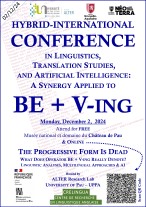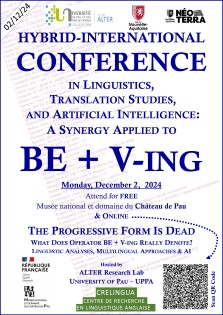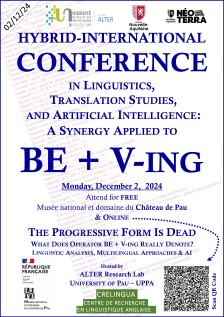Hybrid International Conference in Linguistics, Translation Studies, and Artificial Intelligence: A Synergy Applied to BE + V-ING
Du 1 déc. au 2 déc. 2024
Colloque international hybride de linguistique, traductologie, et intelligence artificielle en synergie appliquée à BE + V-ing
(gratuit en ligne et en salle) VOIR INFORMATIONS EN FRANCAIS SUR LE COLLOQUE ET LES DEUX CONFERENCES EN FRANCAIS DU DIMANCHE 01/12/24 CI-DESSOUS
Attend for FREE at the Musée national et domaine du Château de Pau & ONLINE by scanning the QR code
The Progressive Form Is Dead
What Does Operator BE + V-ing Really Denote?
Linguistic Analyses, Multilingual Approaches, and AI
The International Conference in Linguistics, Translation Studies, and Artificial Intelligence will focus on applying the synergy of these three research domains to BE + V-ing on December 2nd 2024, in Pau (France, at château de Pau) and online.
This free academic event aims to analyze the semantic value and pragmatic function of the linguistic operator BE + V-ing. The study will be further enhanced by examining the possible translations for this English operator into French, Spanish, Italian, Chinese, and a number of other languages. Additionally, translations with AI will be considered, as well as AI-generated explanations for the use and value of BE + V-ing and some of its literal translations like “être en train de + V-Æ” in French, “estar + V-Úndo” in Spanish, “stare + V-Úndo” in Italian, “sein dabei zu + V-Æ” in German, or “正在 + V-Æ” in Chinese.
The conference is rooted in the observation that the term “progressive form” persists in the 21st century, despite evidence showing that BE + V-ING does not inherently denote progression, thereby challenging this terminology. This incongruence has been demonstrated since at least Henri Adamczewski’s 1976 work, which showed that actions in progress are not a common denominator for BE + V-ing verb phrases (VPs). Furthermore, the absence of unfolding actions is not necessarily indicative of the absence of BE + V-ING. In other words, numerous instances of the BE + V-ING form are not inherently linked to ongoing actions, and such actions are also compatible with the simple form.
Nonetheless, the concept of action in progress remains the prevailing semantic interpretation of the operator BE + V-ING among the general public and most linguists. In response to the limitations of these explanations, alternative terms like “continuous form” or “incompletive aspect" (and other aspects such as progressive, continuative, durative, and imperfective)[1] have emerged, though they essentially refer to the same concepts. As Adamczewski stated in 1991:
“We do not believe that merely changing labels can explain any phenomenon whatsoever: the progressive aspect continues to encompass the same old concepts of unfinished or durative action!”[2]
Adamczewski’s meta-operational linguistics offers a simple yet profound logical paradigm that sheds light on the common denominator of all occurrences of BE + V-ing. The invariants he discovered revolve around his phase 1 versus phase 2 perspective. This applies not only to the distinction between the BE + V-ing and simple forms, but also to numerous other grammatical points in many, if not all, languages.
The understanding that BE + V-ing expresses presupposition (a synonym for phase 2) has been embraced and further developed by linguists such as Jean-Pierre Gabilan and Francisco Mate Bon, the latter being renowned for applying meta-operation to Spanish grammar. Alongside other researchers,[3] they will elaborate on their expertise regarding BE + V-ING and its translations with AI, engage in debates during a round table discussion, and address audience questions throughout the international conference.
We encourage you to share this information with colleagues and contacts who may benefit from attending. Thank you for contributing to making this conference an enriching success for all!
The event is free for both in-person attendees at the Château de Pau (where complimentary coffee and croissants await!) and online participants via this link or by scanning this QR code:
To recap, you are invited to join us on December 2, 2024, at 9 am to explore everyday utterances like “Let’s give Chris a big hand! He goes away 8,000 pounds better off! / $8,000 richer!” and “She’s buying her clothes from Harrod’s.” These real-life examples challenge the traditional interpretation of the simple and BE + V-ing forms as representing habits or actions in progress. Instead, as brilliantly demonstrated by Henri Adamczewski in the 1970s and Jean-Pierre Gabilan in the 1990s, meta-operational linguistics offers a powerful alternative with rules that have no exceptions, providing a fresh perspective on the English verb system.
Given these methodological stances, our conference subheading, "THE PROGRESSIVE FORM IS DEAD", invites us all to ask, "WHAT DOES OPERATOR BE + V-ING REALLY DENOTE?" Our eight guest speakers will guide us through "LINGUISTIC ANALYSES, MULTILINGUAL APPROACHES & AI" to blaze trails on this topic and invite audience responses.
Please find below the event poster, leaflet, and brochure with detailed abstracts, bibliographies, and the speakers' bios. This information is also available by clicking on the following links:
https://crelingua.fr/index.php/en/
Feel free to share this information with those of your contacts who may benefit from attending.
The event is free both for in-person attendees at the Château de Pau and for online participants, who can join via this link or by by scanning the QR code available on this page as well as on LinkedIn.
Thank you in advance for contributing to making this conference an enriching success for all!
Le Colloque International de Linguistique, Traductologie et Intelligence Artificielle en Synergie Appliquée à BE + V-ing aura lieu le lundi 2 décembre, à Pau et en visio-conférence. Organisé par le Laboratoire de Recherche ALTER de l'UPPA, en collaboration avec le Musée national et domaine du château de Pau et le Conseil Régional de Nouvelle-Aquitaine, cet événement unique rassemble huit experts de premier plan pour explorer, en anglais, l'affirmation audacieuse capturée dans le sous-titre :
La forme progressive est morte.
Que dénote réellement l'opérateur BE + V-ing ?
Analyses linguistiques, approches multilingues, et IA.
À travers des présentations et des discussions stimulantes, ce colloque remettra en question la vision traditionnelle selon laquelle BE + V-ing fait référence à une action en cours de déroulement, et offrira de nouvelles perspectives sur le rôle de BE + V-ing en tant que marqueur linguistique de présupposition - une compréhension qui peut transformer notre approche du langage et de la traduction. Le colloque est en anglais, mais les traductions de BE + V-ing seront envisagées dans diverses langues et intéresseront donc les spécialistes de français, d'espagnol, d'italien, d'arabe, d'allemand, chinois, etc. (cf. brochure ci-jointe). La journée culminera par une table ronde promettant des échanges enrichissants qui élargiront nos perspectives sur le langage, la traduction et l'IA.
C'est un événement incontournable pour toute personne intéressée par les dernières avancées en linguistique, en traductologie et en IA.
Le colloque est gratuit et ouvert au public dans le cadre exceptionnel du Château de Pau. On peut également assister aux conférences en ligne en cliquant sur ce lien ou en scannant le code QR disponible sur LinkedIn et sur les sites suivants:
https://crelingua.fr/index.php/en/
Conference program
Here is the program for Monday, December 2, 2024, with this subtitle:
The Progressive Form Is Dead
What Does Operator BE + V-ing Really Denote?
Linguistic Analyses, Multilingual Approaches & AI
09:00 – 09:20 : Welcome coffee at the château de Pau
09:20 – 09:30 : Opening remarks
Session chair: Cécile Cosculluela
09:30 – 10:00 : Extralinguistic Parameters and Grammar: Is There a Way out?
The Case of « Simple » Versus « BE + ing » Utterances
by Jean-Pierre Gabilan, University of Savoie Mont Blanc, France.
10:00 - 10:10: Q & A
10:10 - 10:30: Construction of a Metaoperational Pragmatic Model
by Ariel Laurencio, University of Sassari, Italy.
10:30 – 10:40 : Q & A
10:40 - 11:00: coffee break
11:00 – 11:20: Calibrating AI: From Niche Knowledge to Nuanced Meaning
by Ryan Tannenbaum, Ed Tech Developer, South Korea.
11:20 - 11:30: Q & A
11:30 – 11:50: New Insights on the Semantics of Meta-Operator BE+ING: Unveiling the
Binary System Underlying the Meta-Discursive Expression of Views and
Attitudes
by Drissia Chouit, Moulay Ismail University of Meknes, Morocco.
11:50 – 12:00 : Q & A
12:00 - 14:00 : lunch on the boulevard des Pyrénées
Session chair: Jean-Pierre Gabilan
14:00 - 14:30: Deciphering the “Secret Architecture” of Languages: The Role of
BE + ing in English and of its Equivalents in Other Languages
by Francisco Matte Bon, International Free University of Rome, Italy.
14:30 - 14:40: Q & A
14:40 – 15:00: Grammar in Translation: The Case of Be + V-ing
by Mohammed Habib Kahlaoui, Sultan Qaboos University, Oman.
15:00 – 15:10 : Q & A
15:10 - 15:30: Grasping the Lion’s Speech: AI, Linguistic Relativity, and the
Future of Translation
by Pascal Valet, UN Intional Junior School Principal, New York, USA.
15:30 – 15:40 : Q & A
15:40 – 16:00 : coffee break
Session chair: Cécile Cosculluela
16:00 – 16:20 : BE + V-ing in English and its Translation into Arabic
by Abdelhamid Nfissi, University of Fès, Morocco.
16:20 – 16:30: Q & A
16:30 – 17:30: Roundtable with six of the speakers
17:30 – 18:00: Q & A (Audience questions to roundtable participants)
20:00 : Gala Dinner
Conference synopsis
What are the speakers going to talk about?
Here is a brief summary of each of the presentations:
Synopsis of the Speakers’ Presentations
Jean-Pierre Gabilan observes that English teaching relies on grammatical rules based on extralinguistic factors, and that native speakers often deviate from these "rules." Are these deviations merely exceptions? Meta-operational grammar reveals the deeper logic of the language, offering insights into key grammar points like the use of simple vs. BE + ing forms.
Ariel Laurencio builds on Adamczewski's meta-operational concept of the dominant predicate in BE + V-ing constructions, proposing a pragmatic model to predict the illocutionary value of predicative relations. This integration clarifies the link between grammatical operations and the illocutionary level (or intended purpose) in speech acts across languages.
Pascal Vallet explores the integration of Adamczewski's meta-operational perspectives and linguistic relativity into AI tools for translation. He examines large language models' understanding of BE + V-ING and proposes ways to convey implicit meanings across languages and cultures, improving translation quality while preserving cultural diversity.
Drissia Chouit offers original research within the Meta-operational Linguistics framework, explores the binary system distinguishing simple vs. BE + V-ing forms, and their respective semantic values, highlighting communication goals and context. Exposing the limitations of descriptive grammar, she strongly advocates for an understanding of language logic.
Francisco Matte Bon proposes an overall organization of the language system in terms of information status (new vs given) in order to show the role of BE + ING in contrast with other mechanisms available in English as well as with similar grammatical operators existing in other languages.
Mohammed Habib Kahlaoui argues that English grammars mostly use descriptive models, while Arabic grammars remain prescriptive. Both approaches are context-insensitive and conflate language with reality, failing to account for key linguistic operations due to linearity, disregard for context, and monolingual bias, leading to mistranslations. The assumed authority of grammar textbooks should be challenged.
Ryan Tannenbaum investigates AI from both a practical and theoretical perspective in order to help build a better understanding of how to use AI effectively, and how AI is working on a deeper level. The aim is to bring meta-operational linguistic theory into AI systems so t hat they can be an effective learning tool benefiting from Large Language Models’ representation of language and relationships between ideas.
Abdelhamid Nfissi examines the function of BE + V-ING in meta-operational grammar and its translation into Arabic. He highlights the challenges that can be overcome by understanding that the verbal meta-operator BE + V-ING has no reference to the extra-linguistic world, but serves as a discursive trace of abstract operations in utterance processing.
Speakers' Bios
Admission is free
The leaflet is available here.
The brochure is available here.
The poster is available here.
Follow us on LinkedIn & Instagram
Many thanks to the collaborators of the research lab ALTER of the University of Pau (UPPA) for making this conference possible.
Dimanche 1er décembre, au Palais Beaumont pour Les Idées mènent le Monde
15h - Salle Lamartine - Rencontre-débat: Est-ce ainsi que les hommes vivent le langage ?
Cécile Cosculluela, Jean-Pierre Gabilan, Francisco Matte Bon
Cécile Cosculluela (Université de Pau) s’entretiendra avec deux éminents spécialistes du langage, Jean-Pierre Gabilan (Université Savoie Mont-Blanc) et Francisco Matte Bon (Université Internationale de Rome), qui apporteront leur éclairage sur les grandes questions relatives au langage : sa nature, sa fonction, et sa portée notamment. Une discussion de fond (en français) qui promet d'être animée! Elle s'inscrit en prélude au Colloque International de Linguistique, Traductologie et Intelligence Artificielle en synergie appliquée à BE + V-ing, organisé par l'Université de Pau avec le soutien du Conseil Régional de Nouvelle-Aquitaine, le lundi 2 décembre au Château de Pau; également accessible en visioconférence. (Conférences en anglais, entrée libre et gratuite dans la limite des places disponibles.)
Dimanche2 décembre, au Palais Beaumont,
17h - salle Grenier - dans le cadre des rencontres littéraires "Les idées mènent le monde":
Regards croisés sur la grammaire linguistique en anglais et en espagnol
- 17h-17h15 Jean-Pierre Gabilan, Grammaire expliquée de l'anglais (2020)
- 17h15-17h30 Francisco Matte Bon, Gramática communicativa del español (1992)
- 17h30-17h45 Cécile Cosculluela, The English Verb Equation (2022)
- 17h45-18h Questions aux trois auteurs
[1] In French, « l’aspect inaccompli » is among the most common labels.
[2] Translation by Cécile Cosculluela of Henri Adamczewski, Le français déchiffré, clé du langage et des langues, Armand Colin éditeur, Paris, 1991, p. 107 : “Quand on parle d’aspect [perfectif (en gros: achevé, accompli) … ou imperfectif (non achevé, duratif, itératif)]* en grammaire, on pense quasi-automatiquement aux langues slaves, alors que bien d’autres langues: le grec ancien, l’hébreu, l’arabe voire le chinois, pour ne citer que quelques cas, connaissent le phénomène. Dernièrement, la catégorie "aspect" a aussi été importée en français et en anglais notamment. C'est ainsi qu'en français la distinction passé simple/imparfait est maintenant présentée comme une distinction aspectuelle. Il en va de même en anglaise où d’aucuns parlent d’aspect progressif pour la construction remarquable BE + ING. Nous ne pensons pas qu'un simple changement d’étiquette puisse expliquer quelque phénomène que ce soit: l'aspect progressif continue de recouvrir les vieilles conceptions de l’action inachevée ou durative!” (* Le texte entre crochets apparaît plus loin page 107 dans ce passage intitulé « Les aspects perfectif et imperfectif »)
[3] See the conference program. Cécile Cosculluela, who will serve only as a moderator during the conference, investigates the synergy between meta-operation and semiotics, an interdisciplinary field that some of the speakers might explore.





